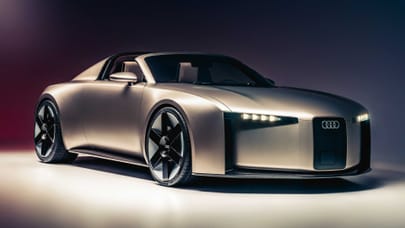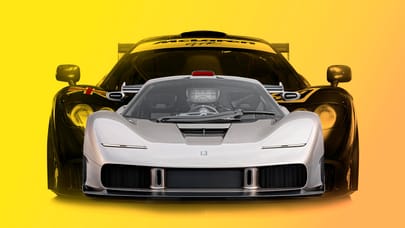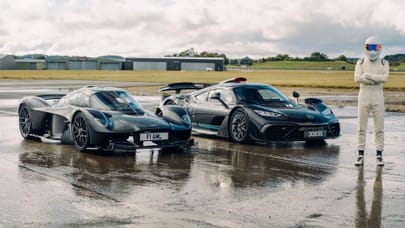
How does VW recover from dieselgate?
VW's Jürgen Stackmann takes us through the next steps for the German carmaking giant
"I have some new cheat box! No one’s ever going to find out about this one…" British comedian Simon Brodkin, aka Lee Nelson, pranked disgraced FIFA president Sepp Blatter last year, and earlier this week he disrupted Volkswagen’s Geneva press conference. VW’s sales and marketing board member Jürgen Stackmann barely missed a beat: "It doesn’t need repairs. It’s a perfect car."
Stackmann is a key player in VW’s post-dieselgate reputational recovery. He wearily concedes to TG.com in a meeting after his difficult day that being the butt of the joke is just one of the prices you pay after a screw-up of such monumental proportions. "I thought: hang on, this didn’t happen in the rehearsal…" Besides, it’s small beer compared to the £5.2bn set aside so far to rectify customers’ cars and absorb the legal bill that awaits, but still hurtful for a company that was such a resounding symbol of German corporate strength. Where the hell do you start? Stackmann is crystal clear on this.
"The first thing to do is to carry out every service recall with the same, uncompromised quality. We understand the challenges: I visited our 10 biggest fleet customers recently and spoke to them about the situation. Some of them have bought 25,000 cars from us – so they are big customers. They expressed no doubts about the core qualities of the engineering on our vehicles. But there were clear question marks over our corporate culture."
This has been one of the key questions: was something fundamentally and badly broken at the top of VW that resulted in such unethical behaviour?
"It’s very tough to take a view on that," Stackmann says. "As employees, we were all just as shocked as everyone else. We’re as interested in the results of the report [due early summer] as you are. There probably isn’t a company as German as Volkswagen. So we all thought – this can’t be true…"
Stackmann is leading the charge on explaining to VW’s "five or six million customers who need persuading that we are competent. Our goal in 2016 is to regain the trust of our customers by bringing the cars back to the right standards. They want the same noise, the same performance, the same fuel economy, and the same experience, so that’s going to be bloody hard work." But while this behemoth prepares to shift its approach, like a supertanker doing a three-point turn, he also stresses that "there is a lot of competence in the house. We have to be careful not to delete that".
With the interlocking Group infrastructure now unpicked, VW, he says, will concentrate on what it’s best at. "Vehicle excellence. Substance. Attention to detail – these were all things we were good at. But there were some bits that weren’t taken care of. We want to be leaders in connectivity and electric mobility. We were in it, but we weren’t leaders there. One of the questions we’re asking is: what is premium in the electric sphere?"
If this all sounds like a huge corporate mea culpa, Stackmann insists that VW would have gone in this direction even if it hadn’t been caught fiddling its software code. "Absolutely!" he says.
He maps out a future for VW – and the industry – that is dominated by connectivity, electrification and autonomous driving, although we can also expect a handful of new SUVs, including a seven-seat Tiguan and an all-new Touareg (more than 60 per cent of US passenger car sales are SUVs or trucks: expect that to go to 99 per cent if Donald Trump makes it all the way). Diesel, he says, also still has a strong future. But the picture now is of 40,000 VW engineers newly focused on a common cause, rather than working away in individual silos. He points to Norway – with its countrywide EV network and sustainable electric supply – as a model, and insists that the west coast of China is going to rapidly transform itself in terms of electric infrastructure. And as for the looming presence of Apple and Google…
"There is an interesting exchange occurring. We are going from hardware to software. They are moving from the software to the hardware. We are not afraid of Apple. I don’t think they’ve really grasped the long-term reality of the business we are in. [Cars] are very complicated things."
Top Gear
Newsletter
Thank you for subscribing to our newsletter. Look out for your regular round-up of news, reviews and offers in your inbox.
Get all the latest news, reviews and exclusives, direct to your inbox.
The Golf GTI, Stackmann says, is VW’s sports car, and it’s clear that anything else – including a long-rumoured presence in Formula One – is a distraction the company does not need, not least when the focus is on rebuilding trust. "We are creating a culture where the necessary level of service is ongoing, and we have a stable platform from which to grow. There are no shortcuts to that."
"Great brands are often great because they have clarity," he adds. "Dealer networks tend to spit out cars that aren’t part of the genetic code. Das Auto has gone. It has been replaced by one word: Volkswagen. That is all we need to say."
Trending this week
- Car Review
BMW iX3








